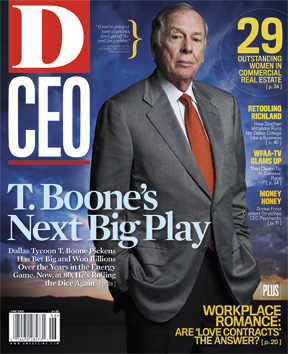A recent letter to Businessweek magazine columnists Jack and Suzy Welch asked, “With all the presidential candidates ranting and raving about corporate greed … shouldn’t members of the business community be doing a better PR job explaining the basics of capitalism?”
Astonishingly, the Welches replied: “Not unless they possess the strange and burning desire to get blamed, scorned, disparaged, and excoriated.” After the November election, the Welches went on, politicians of both parties will shelve the inflammatory rhetoric and “embrace a reality that most of them know perfectly well. Business isn’t the enemy of people—it is people.”
Rick Douglas, the former president of the Greater Dallas Chamber and now executive vice president of The Staubach Co., thinks that’s a risky strategy. “If CEOs don’t step up to the plate and defend the concept of capitalism, we are in big trouble,” he says.
I heartily agree. Most Americans are appallingly ignorant about the way businesses actually function and the blessings free enterprise brings. Too many industries and companies are relying on paid advertising to carry their message—or they may be relying on the power of prayer. They should remember what one of the great Catholic cardinals once said: Pray hard, but row away from the rocks.
The message to CEOs is, it’s time to start rowing. Get out in front of any and all groups to talk about how businesses employ people, create jobs and wealth, and how decisions about taxes and regulations that affect business have an impact on people’s lives.
For a good example of inflammatory rhetoric about capitalism, consider Sen. Barack Obama’s comment about Irving-based ExxonMobil in February. “ExxonMobil made $11 billion last quarter,” Obama said. “They don’t want to give those profits up easily.”
The comment betrayed no recognition of the fact that ExxonMobil’s earnings go to pension funds and individuals who have invested in the company. There was no mention of how the changing world environment has made exploration riskier and more difficult. Even more disturbing than Obama’s comment was the silence that greeted it from the business sector. While one can understand ExxonMobil’s reluctance to mix it up with the hot politician of the moment, where were other business leaders?
Virtually everyone who has been in business agrees that business leaders need to get out, explain, and advocate. “Free enterprise is to economic freedom what democracy is to political freedom,” says former Sen. Phil Gramm, who holds a Ph.D. in economics. “While few Americans would think of taking away someone’s right to exercise their political freedom, it’s commonplace for politicians to call for taking away people’s rights to economic freedoms and the fruits of their success.” Gramm’s wife Wendy, also a Ph.D. in economics and a former director of the Bureau of Economics of the Federal Trade Commission, adds: “If people who understand and benefit from free enterprise don’t talk about it and advocate it, who will?” More than two decades ago, her husband noted that businesspeople are often the worst salespeople for the economic system that has fostered their success.
Dallas Mayor Tom Leppert, the former CEO of Turner Corp., says, “As a CEO, I felt it was important to talk to people who didn’t necessarily agree with me.” He says more outreach on this topic will help Dallas. “People need a better understanding of how important it is to attract capital, and that benefits Dallas,” Leppert says. “A supportive citizenry helps attract business, create jobs, and expand the tax base. It would be a competitive advantage for us.”
Douglas, the Staubach Co. executive, understands why CEOs aren’t rushing to tackle the topic. “There is a tendency today for CEOs to be quite preoccupied with the requirements of running their businesses,” he says. “Also, there has never been a tougher time for anyone to be in a leadership role or to take a public stance, because of the many opportunities for such actions to be criticized.” However, he says, that doesn’t excuse the silence—and Leppert concurs. “CEOs today need to interact with the public,” the mayor says. “That’s part of their job. The public influences success or failure on key issues. Public understanding and opinion can even influence whether individual companies succeed or fail.”
There’s more than a presidential campaign going on. Business needs to campaign for the hearts and minds of the American public. If CEOs will embrace capitalism as a positive word and talk about the linkage of business and economic prosperity, others will join the conversation.
Merrie Spaeth is one of the country’s leading communications strategists. After serving as President Reagan’s director of media relations, she founded Dallas-based Spaeth Communications in 1987. She is also a lecturer at Southern Methodist University’s Cox School of Business.






